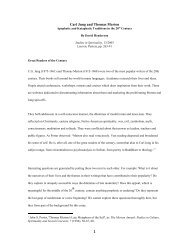1 Neoplatonism and Analytical Psychology - The Association of ...
1 Neoplatonism and Analytical Psychology - The Association of ...
1 Neoplatonism and Analytical Psychology - The Association of ...
Create successful ePaper yourself
Turn your PDF publications into a flip-book with our unique Google optimized e-Paper software.
Psyche (soul) flows out from nous. Each philosopher has their own way <strong>of</strong> describing the detail <strong>of</strong>emanation <strong>and</strong> return, but one particular point <strong>of</strong> debate revolves around the descent <strong>of</strong> soul.My suggestion here is that this debate within neoplatonism about the descent <strong>of</strong> soul can serve as ametaphor to illuminate different approaches to the self in analytical psychology. In a sense I am looking atthese theories as contemporary versions <strong>of</strong> the myth <strong>of</strong> emanation <strong>and</strong> return. For the purposes <strong>of</strong> this talk Iam equating the neoplatonic idea <strong>of</strong> soul with the concept <strong>of</strong> the self in analytical psychology.Plotinus held that while psyche generates beings <strong>and</strong> permeates life, some essential aspect remains withinnous. Proclus argued, against Plotinus, that psyche descends entirely into life. In its generating activity itloses touch with nous. Dionysius describes a relationship <strong>of</strong> mutual ecstasy between the One <strong>and</strong> soul. Each<strong>of</strong> these views <strong>of</strong> the descent <strong>of</strong> soul has consequences for the character <strong>of</strong> its return to nous <strong>and</strong> ultimatelyto the One.Hollis/PlotinusPlotinus distinguished between the descent <strong>of</strong> soul <strong>and</strong> the fall <strong>of</strong> soul. <strong>The</strong> descent <strong>of</strong> soul is natural,generative <strong>and</strong> purposive. <strong>The</strong> fall <strong>of</strong> soul is the result <strong>of</strong> audacity (tolma). It results in forgetfulness <strong>and</strong>ignorance. It is the consequence <strong>of</strong> a desire to belong to oneself <strong>and</strong> to be independent <strong>of</strong> the One.This mirrors Hollis description <strong>of</strong> the midlife crisis, in his book, <strong>The</strong> Middle Passage: From Misery toMeaning in Midlife. He distinguishes between the “acquired self” or ego <strong>and</strong> the “greater Self which seeksits own realization.” ii In the first half <strong>of</strong> life the self (small s) loses itself in life in the world <strong>and</strong> becomesidentified with the roles <strong>and</strong> goods <strong>of</strong> the world. In midlife “perhaps the greatest shock <strong>of</strong> all is the erosion<strong>of</strong> the illusion <strong>of</strong> ego supremacy.” iiiHollis’ prescription for the wounded ego is to establish a relationship with the Self. This involveswithdrawal <strong>of</strong> projections, a turn within <strong>and</strong> entry into solitude. This connection with the Self is possible2



